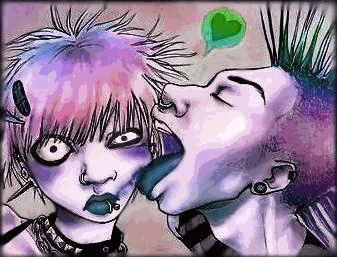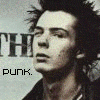Navigation
User Options
 (online status not displayed)
 If there is anything else you would like to know after reading this, feel free to ask. I can't guarantee that I'll know the answer (I'm no punk expert), but I know people that will. And I have Google. :D If you are here, then you are wanting to learn the truths about punk music and what it really means, or you have been directed here by someone that thinks you need to learn what it is. Either way, you won't be made fun of here. We are more than happy to teach you so please sit down, get some paper and a pencil, and take some notes (there will be a quiz at the end of class).
A Brief History of Punk Rock Punk rock (from 'punk', meaning rotten, worthless, or snotty; also a prison slang term for a person who is sexually submissive) usually refers to the anti-establishment music movement of the period 1976-80, exemplified by the Sex Pistols, The Damned, The Clash and The Ramones, and to subsequent music scenes that share key characteristics with these first-generation "punks." The term is sometimes also applied to the fashions or the irreverant "do-it-yourself" attitude associated with this musical movement. The term "Punk rock" was originally used to describe the primitive guitar-based rock and roll of untutored US bands of the mid-1960s such as The Seeds from Southern California and The Standells from Boston. Probably the first use of the term "punk" music was in Lester Bangs' 1971 essay "Psychotic Reactions and Carburetor Dung" (collected in the book of the same name, ISBN 0679720456): "punk bands started cropping up who were writing their own songs but taking the Yardbirds' sound." A year later Lenny Kaye, in the liner notes of the anthology Nuggets, uses the term "punk-rock" to refer to the Sixties music now usually called "garage rock", plus some of the darker elements of psychedelia). Shortly after this, Lenny Kaye began performing avant garde proto-punk music with poet Patti Smith, so this would seem to lead directly to the use of the term by the music we now know as punk. The roots of punk rock also lie in the abrasive, dissonant style of the Velvet Underground, the Detroit bands The Stooges and MC5, the UK pub rock scene, and glam rock groups such as The New York Dolls. An important feature of Punk Rock was a desire to return to the directness of early rock and roll. Punk rockers rejected what they saw as the pretension, commercialism and pomposity which had overtaken rock music in the 1970s, spawning superficial "disco" music and grandiose forms of heavy metal, progressive rock and "arena rock". Punk rock, by contrast, emphasised simplicity of musical structure, extolling a "DIY" ("do it yourself") ethic that anyone could form a punk rock band (the early UK punk fanzine Sniffin' Glue once famously included drawings of three chord shapes, captioned, "here's a chord, here's another one, here's another one. Now form a band"). The lyrics introduced a confrontational frankness of expression in matters both political and sexual, often dealing with urban boredom and rising unemployment in the UK--e.g., the Sex Pistols' "No Future"--or decidedly anti-romantic depictions of sex and love, such as the Dead Kennedys' "Too Drunk to Fuck" or the Sex Pistols' "Submission." The influence of the situationist movement of the 1950s and 60s is apparent in the vanguard of the British punk movement, particularly the Sex Pistols. This was a conscious direction taken by Pistols prime movers Malcolm McLaren and Vivienne Westwood, and is apparent in the artwork of Jamie Reid, who had previously been involved with Suburban Press and King Mob, and designed many of the band's graphics. The cover song, in the hands of a punk band, can often be an instrument for irony and commentary on popular culture. Patti Smith's Horses album contains two examples of reclaimed mainstream songs. Other examples include the Dead Kennedys' cover of "Take this Job and Shove It", (David Allan Coe) Siouxsie & the Banshees' "Helter Skelter" (The Beatles) or Black Flag's lyrically-altered "Louie Louie" (Richard Berry, popularized by The Kingsmen). At least as important as the music, however, was the associated culture, which at the time caused great furor amongst the establishment. Punk fashion revolved around severe haircuts, such as the mohawk, body piercing (often with safety pins) and conversion of items such as bin liners and thrift store remnants into clothing. "Punk chic" has now been largely absorbed by the mainstream. Punk devotees created a thriving underground press. In the UK Mark Perry produced Sniffin' Glue. In the United States magazines such as Maximum Rock 'n Roll, Profane Existence and Flipside were leading a movement of fanzines. Every local "scene" had at least one primitively published magazine with news, gossip, and interviews with local or touring bands. The magazine Factsheet Five chronicled the thousands of underground publications in the 1980s and '90s. In the late 1970s punk interacted with reggae & ska subcultures, to form the 2 Tone movement that included bands such as The Specials, Madness and The Selecter. In the 1980s the anti-establishment and "DIY" truly came into its own in the United States and the UK with bands like MDC, Crass, Bad Brains, Vice Squad, Minor Threat, JFA, The Dicks and more that never showed up on the industry charts, but none-the-less had a huge effect on popular culture. Not having to deal with the paradox of claiming anti-establishment values while at the same time being just another part of the music industry, which so many 1970s punk bands struggled with, many of the punk fans, bands, fanzines and magazines (Maximum Rock 'n Roll magazine and Cometbus for instance) were able to focus on the music, philosophy and politics, rather than the fashion. These years, approximately 1980 to 1986, is considered the peak of hardcore punk. Punk has had a lasting influence on all popular music and a thriving subculture can still be found almost anywhere in the United States. Punk rock underwent a brief commercial renaissance in the late 1990s with bands like Rancid, Green Day, The Offspring, NOFX and others. My Personal Top 10 Favorite Punk Bands(Not in Order)  Misfits Misfits  Crass Crass  Aus Rotten Aus Rotten  Oi Polloi Oi Polloi  Rancid Rancid  The Clash The Clash  The Ramones The Ramones  Operation Ivy Operation Ivy  Circle Jerks Circle Jerks  The Adverts The Adverts Why pandas? Becuz pandas r lyke da most pxnk rawk thing eva! Avril Lavigne is pop through and through kiddies. Don't deny it.  Lots of today's pop/pop rock bands and artists (especially Miss Lavigne) are often confused to be punk. Here's a few good real ones that you should check out: http://www.myspace.com/potentialthreatfanpage http://www.myspace.com/againstempire http://www.myspace.com/straybullets http://www.myspace.com/mischiefbrew More will come later. The "Brief History of Punk Rock" section is from here as I'm too lazy to come up with my own words to write. There is also a wonderful list of links on that site if you want to learn more about punk.
User CommentsAdd your commentPlease login or register to submit your comment. | ||||||||||||||||||||||||||||||||||||||||||||||||||
Posted on: May 30th 2013, 4:33:56pm